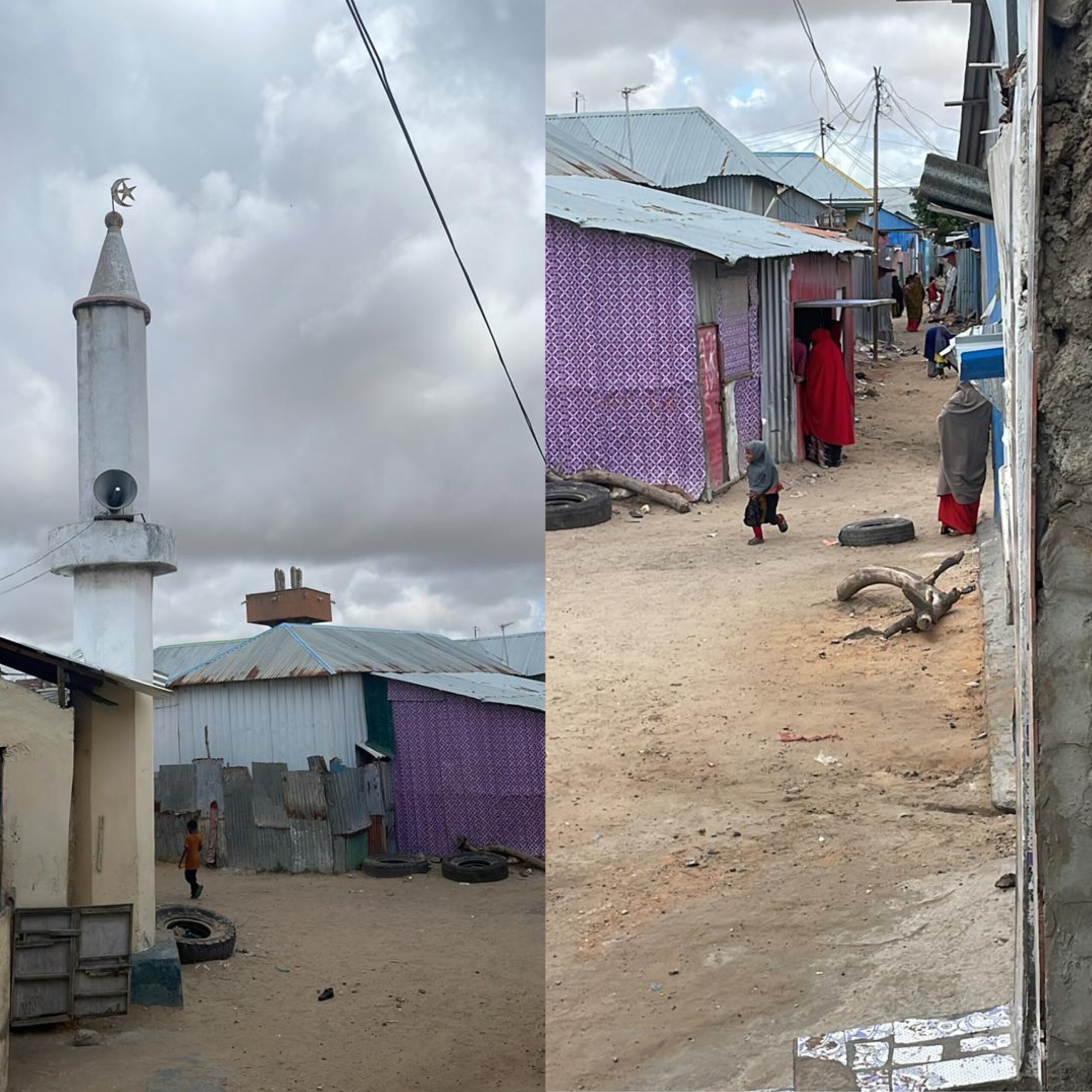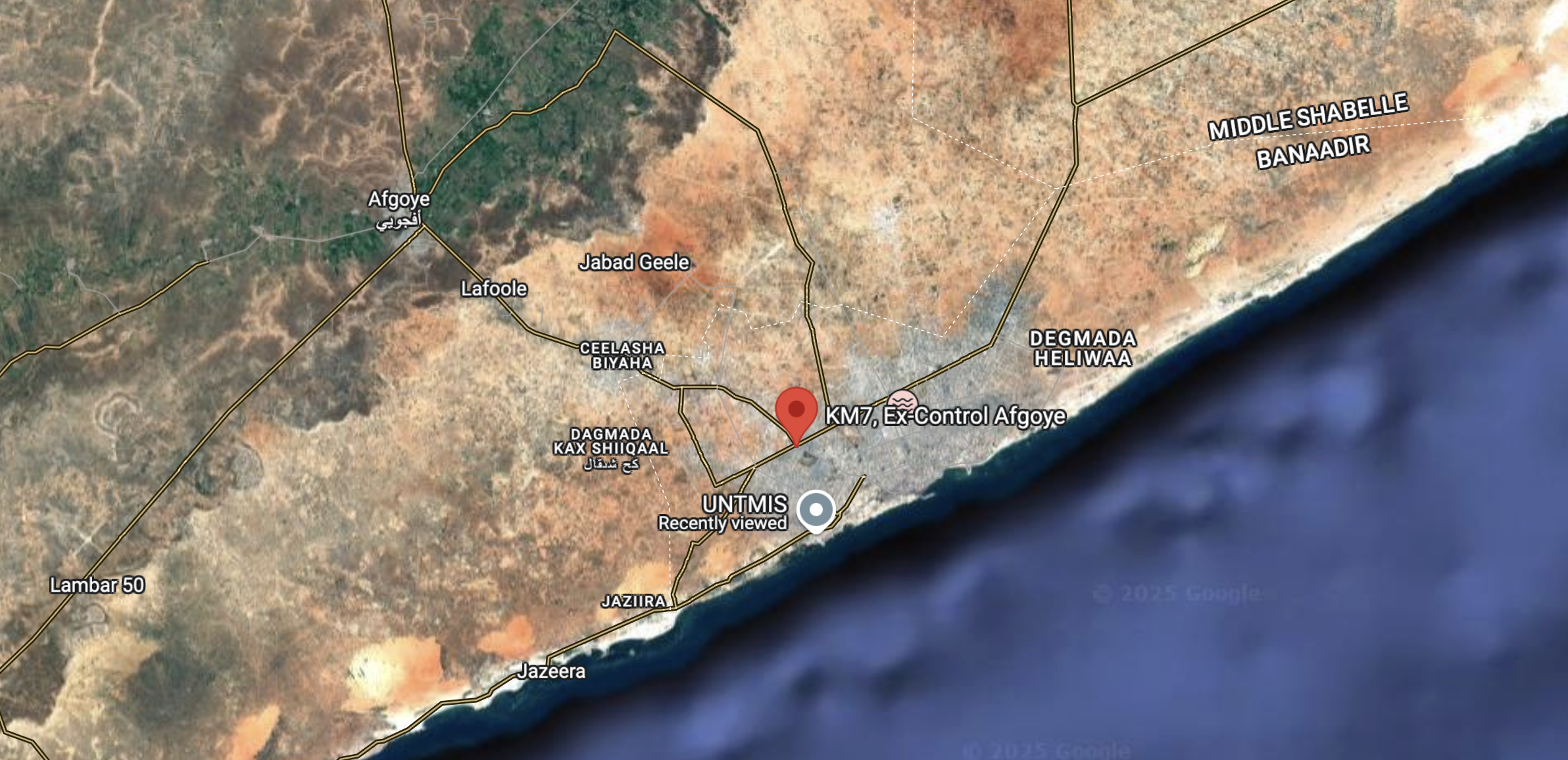MOGADISHU (Kaab TV) – Armed police units led by Mogadishu’s Galbeed Police Station Commander, Yasin Ganey, launched a dawn raid on Saturday targeting a displaced community living in the former Pharmaceutical Factory (Ex-Warshadda Daawada) along the Afgooye-Mogadishu road.
This marks the second such assault on the settlement in less than a month.
The area, home to over 2,000 internally displaced people—many of whom have lived there for more than three decades—was surrounded by armed officers who ordered residents to vacate immediately.
“The armed men began spraying red paint on our makeshift houses. They were armed. We were shocked—my children, who were asleep, woke up and started crying,” said Fadumo, a disabled resident paralyzed in an accident.

Local elders and residents told Kaab TV that Commander Ganey claimed he was acting under direct orders from Banadir Regional Police Commissioner Mahdi Omar Moalim, commonly known as “Macallin Mahdi”.
Both Ganey and Mahdi are former members of the militant group Al-Shabaab who are now integrated into Somalia’s federal police.
Residents—including women, children, and elderly people—were threatened with bulldozers if they failed to leave within 24 hours.
“They gave us an ultimatum. If we don’t leave, they said they would flatten our homes,” said Sultan Mahamud Adan, speaking on behalf of the affected families.
The settlement—once the government’s pharmaceutical storage site under the former military regime—has served as a home for generations of displaced Somalis.
Many current residents were born and raised in the camp, forming a long-standing informal community.
Health Ministry Denies Involvement as Al-Shabaab Links Emerge
Federal Health Minister, Dr. Ali Haji Adam said his ministry had not authorized any eviction from the former pharmaceutical site and had no knowledge of any government plan to repurpose the compound.
“My ministry was not informed any plans to evict the people or anything related to the former factory of the Warshadda Daawada,” he said.
Insiders allege that a businessman with historical links to Al-Shabaab paid bribes to federal officials to acquire the land.
These reportedly include Banaadir Regional Court Chairman Salah Ali Mahmoud—commonly known as Salah Dabaan—whose brother serves as a judge in Al-Shabaab’s shadow courts in southern Somalia. Salah is also a close ally and clansman of President Hassan Sheikh Mohamud.

The unnamed businessman is reportedly planning to convert the land into a private vehicle garage.
A police source confirmed to Kaab TV that substantial bribes were paid to senior police and judiciary officials to carry out the eviction.
Commander Yasin Ganey has refused to comment beyond stating that he is “acting on orders from above.”
The families we spoke to said that no alternative housing, relocation assistance, or compensation has been offered, making it difficult for them to relocate.
Women in the camp expressed deep concern for the welfare of their children and elderly relatives.
“We don’t know where to go. We have children and elderly who can’t walk. We have nothing,” said Halimo Mahmoud, who has lived in the area since childhood.
Pattern of Forced Evictions and High-Level Land Grabs
This incident is part of a broader trend. In August 2023, armed police and members of the national intelligence (NISA) similarly evicted dozens of impoverished families from land once belonging to the former Ministry of Veterinary which is adjacent to the current site.
That land was reportedly handed over to businessmen connected to one of President Hassan Sheikh Mohamud’s wives, Qamar Ali Omar, who allegedly profited from the transaction.
In another incident on April 29, armed men under Macallin Mahdi’s orders raided another former factory along Mogadishu’s Industrial Road in Dayniile District, forcibly evicting over 500 displaced families.
That same day, four local journalists covering the eviction were shot at and later arrested by police, according to the Somali Journalists Syndicate (SJS). After hours in detention, the journalists were released—but only after their footage was deleted.
The April eviction was also allegedly orchestrated by wealthy businessmen who enlisted Macallin Mahdi to forcibly remove vulnerable families—including women and children—who had lived at the site for years.
Throughout his current term, President Hassan Sheikh Mohamud has faced ongoing accusations of corruption and complicity in land grabs targeting vulnerable communities.
Local media and civil society groups say thousands of families have been evicted from public land in Mogadishu since 2022.
These lands are often sold or leased to political allies, powerful businessmen, or individuals linked to the president’s inner circle, usually without due process or transparency.

Rights advocates describe these evictions as part of a systematic campaign of forced displacement driven by profit and elite enrichment—frequently carried out by military and police forces under government orders.
“Internally displaced people usually live in privately owned settlements without land tenure documents. This has resulted in a number of forced evictions, which remains a critical protection concern,” said NRC’s Abdukadir Mohamed in a June 2023 report.
According to the NRC, more than 2.6 million people in Somalia live in camps for internally displaced persons (IDPs).
Due to mass migration from rural areas, many IDPs have settled in cities, where they face ongoing difficulties in finding work and securing basic necessities.


